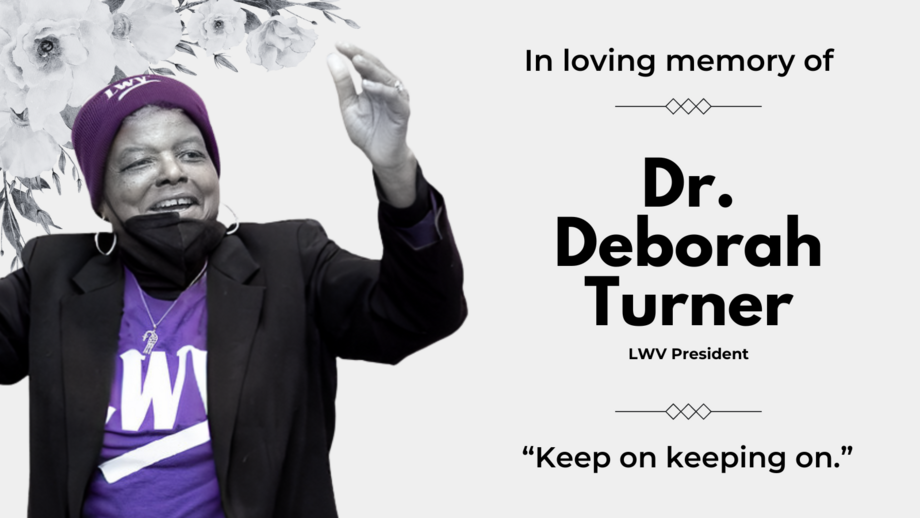by Susan Daniel, LWVWA Board Member
I was fortunate to meet Dr. Deborah Turner at LWVUS Council in Las Vegas in June 2023. Besides seeing her share her leadership style and wisdom during a three-person interview panel, I got to interact with her when we were in the same small discussion group during lunch.
Dr. Turner was impressive. She conveyed competence. She was calm, friendly, and engaging. She was the kind of leader who trusted others to do their jobs well and so they did. She was a steady hand at the helm of League of Women Voters.

"When I asked Dr. Turner if we could take a selfie together, look who she put first. That was her leadership style."
I later learned that Dr. Turner was a medical doctor, an OB/GYN, who had practiced medicine for 35 years in the Midwest, and that she returned to school again later in life to earn a law degree in 2007. Again, impressive.
I’m glad I got to meet her. She will be missed.
Read about some of the wisdom and inspiration Dr. Turner shared with the League during her nearly four-year tenure as LWVUS President here. Continue on below to read the remarks from LWVUS CEO, Virginia Kase Solomón, below.


Dear League members,
It is with great sadness that I share the news that LWVUS President Dr. Deborah Ann Turner passed away Sunday morning.
This unexpected news has struck all of us at the LWVUS Board and staff with profound grief, and I know you all are feeling it too. We are grieving together as a League community for our beloved leader and friend.
You can read our official statement on LWV.org here.
A fearless advocate for voting rights and women’s rights, Dr. Turner devoted her life’s work to impacting meaningful changes in the lives of voters across the nation. As the 20th president of our 103-year-old organization, Dr. Turner played a pivotal role in fighting for a more fair and representative union while uplifting racial equity in the League’s mission work.
Dr. Turner first joined the League of Women Voters of Metro Des Moines in 2010 and later served as president until 2015. At the same time, she also served on the LWV Iowa board as the state vice president from 2011 to 2015, becoming co-president in 2015. In her dual roles with state and local Leagues, Deborah devoted her leadership to strengthening relationships between local leagues and the state Board.
Dr. Turner practiced gynecologic oncology for 35 years, working directly with patients and teaching students and trained residents in university programs across the Midwest. She participated in a dozen international medical missions and served as the associate medical director of Planned Parenthood of North Central States.
In the midst of this enormous loss, we are ensuring the great work she started moves forward. The LWVUS Board met Sunday night in accordance with our bylaws, and Sania Irwin assumed the role of Board president. Additionally, I was scheduled to step down as CEO after February 2; however, in light of Dr. Turner’s passing, I have agreed to stay on staff an extra week to help in the transition. As was already planned, Alma Couverthie and Kelly McFarland will take over as interim co-CEOs while the Board performs their search for a new CEO.
You may send condolences electronically to lwv@lwv.org and in writing to the national office at 1233 20th Street NW, Suite 500, Washington, DC, 20036. All messages will be shared with Dr. Turner’s family.
The League of Women Voters staff, Board, and Leagues from across the country mourn her loss, and our thoughts are with Dr. Turner’s family during this difficult time. We are committed to honoring her legacy by continuing to uphold our values to empower voters and build a stronger, more inclusive democracy. As Dr. Turner always said, “We will keep on keeping on!”
In League,

Virginia Kase Solomón
LWVUS CEO
